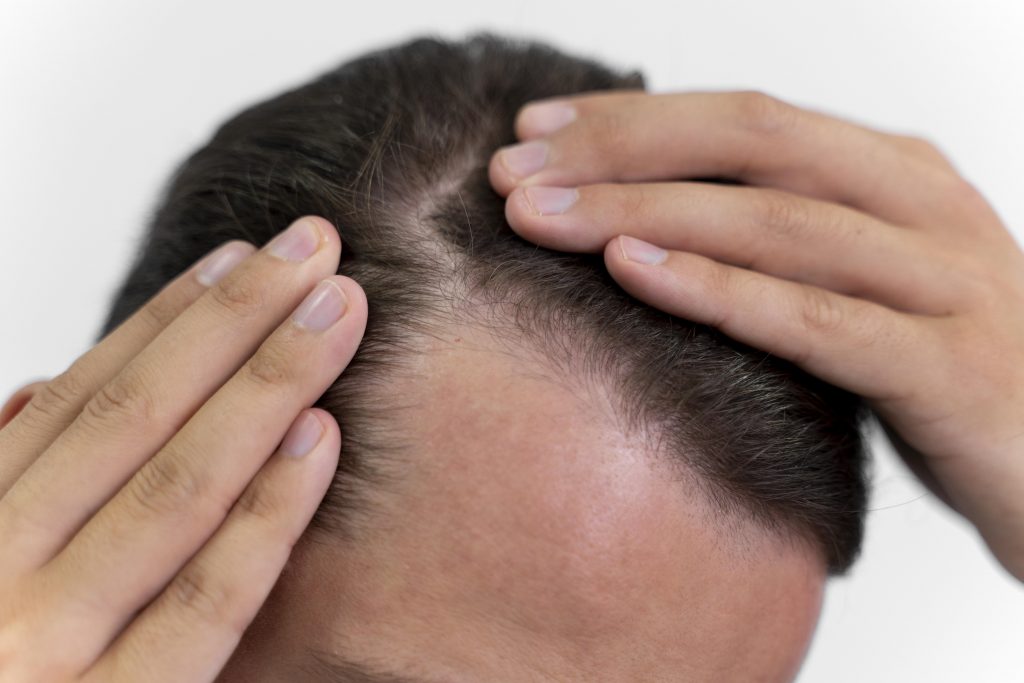- Fast results
- 4,000+ locations
- 4.8 star rating
Need Help? (888) GET LABS



When they say your hair is like an invisible crown for your self-esteem, they weren’t kidding. So, when hair loss becomes an unexpected issue, it’s normal to feel alarmed.
Fortunately, you can deal with sudden hair loss or alopecia through proper medical steps.
For starters, you can take blood tests like CBC, hormone tests, and iron level assessments. But first, it’s imperative to understand the potential cause of alopecia based on recent changes in your life. Hence, a visit to your doctor always goes hand-in-hand with alopecia blood works.
If you’re wondering which blood test is appropriate for alopecia, just read on to find the answers you need.
Alopecia is depicted by sudden hair loss. It usually occurs on the hair in the head, but it could also affect hair in other body parts such as your eyebrows and other facial hair.
Hair loss happens naturally to anybody but in small negligible amounts. People shed hair daily. According to the American Academy of Dermatology Association, we lost about 50 to 100 strands of hair a day.
However, when hair loss becomes excessive all of sudden and hair growth seems to slow down, it could be due to an underlying condition.
Whether it’s permanent or temporary depends on the results of the alopecia blood tests.
Sudden hair loss can happen in different ways. For example, it could start from gradual thinning or falling hair patches on a localized area.
Nonetheless, whichever way hair loss begins, there’s a form of alopecia associated with it. That being said, check out the different types of alopecia below.
Alopecia areata is an autoimmune disease that usually starts as an oval or round patch of skin on any body part where hair is expected to grow.
As an autoimmune disease, this condition is characterized by the immune cells attacking your hair follicles leading to hair loss.
While the typical hair fall occurs on the head, with alopecia areata, you can observe hair loss in your beard, eyelash, or eyebrows.
You may have heard of male pattern baldness. But did you know that women can also experience the same degree of hair loss?
Although it’s rare, women are not entirely immune to androgenetic alopecia. This condition exhibits gradual hair thinning instead of a recession due to the size reduction of the hair follicles.
A person diagnosed with scarring alopecia suffers permanent hair loss. This is because the hair follicles are destroyed, turning their growth zone into scarring tissue.
As a result, it kills off the chances of hair growth, leaving the individual bald or semi-bald indelibly – unless you opt for a hair transplant.
Traction alopecia is the consequence of having your hair pulled consistently. It could be associated with trichotillomania, a psychological condition where a person cannot resist pulling out hair.
On the other hand, it can also be due to tight hairstyles or frequent use of hair relaxers and extensions.

Alopecia has links to several health conditions and life events.
For example, hair loss is a prominent symptom of the autoimmune disease alopecia areata, which was explained earlier.
Likewise, the condition is associated with imbalances concerning thyroid and sex hormones.
Nonetheless, here are some of the common causes of sudden hair loss or alopecia.
Yes, a blood test can diagnose alopecia. Your doctor may order several blood works to determine the cause of the hair loss along with a scalp biopsy.
In most cases, the particular lab tests your doctor could depend on accompanying symptoms or recent life changes you have.
For example, if you have just given birth and you have experienced alopecia, the cause of the condition could be traced to postpartum hormonal imbalance.
On the other hand, if your doctor suspects the autoimmune disease alopecia areata, your bald spots will need to be inspected first. Then blood tests like antinuclear antibodies (ANA) test will be ordered.
Detecting the cause of alopecia is done through the following blood tests:
A complete blood count (CBC) is a low-cost standard blood test ordered to help diagnose many conditions.
With that, CBC also allows your doctor to get an overview of your blood cell activities. This includes inflammation attributed to follicular attacks due to infection or autoimmune reactions.
The C-reactive protein (CRP) blood test is another way to determine inflammation levels associated with alopecia.
CRP is an established marker for autoimmune inflammation. So, you can expect to take this test if you are suspected of having alopecia areata.
Generally, an antinuclear antibodies (ANA) test often diagnoses autoimmune diseases. The principle is quite simple.
If ANA is present in your blood samples, it could indicate an autoimmune disorder like alopecia areata.
Sudden hair loss is linked to long-term thyroid diseases such as hypothyroidism and hyperthyroidism. Therefore, examining any fluctuation in thyroid hormone production helps identify if the condition is related to the said disorders.
Thyroid hormones play vital roles in different physiological processes involving growth. Hence, an imbalance in hormones like T3 and T4 can disrupt hair growth and follicle health.
Studies have shown the direct link between iron deficiency and hair loss, similar to androgenetic alopecia.
In that case, rapid and frequent hair fall can also become a parameter for detecting iron deficiency and vice versa. And to determine the condition, your doctor will most likely order blood tests that screen for iron and ferritin.
The role of sex hormones in the development of alopecia is not surprising at all. If you think about it, hair growth cycles become more apparent during puberty when the production of these hormones starts to increase.
Nevertheless, continuous research uncovered that the primary hormone responsible for androgenetic alopecia or pattern hair loss is dihydrotestosterone (DHT).
DHT is an androgen. It is a derivative of testosterone, which primarily develops secondary male sexual characteristics, including hair growth. However, high levels of DHT shrink the hair follicles, making you lose your hair rapidly.
You can detect if alopecia is related to DHT by taking blood tests that measure sex hormones like the following:
Prolactin is a hormone produced for breast growth and milk production. However, excessive prolactin levels promote hair loss. This leads to many cases of postpartum hair loss among pregnant and lactating women.
Since elevated DHT is the main culprit for pattern hair loss, it only makes sense that increased testosterone influences alopecia. After all, DHT is an offshoot of testosterone.
You can check the levels of this hormone through the appropriate blood test.
Low estrogen and progesterone are also linked to hair loss among women. That’s why it is not uncommon for women undergoing menopause to experience rapid hair fall and slow follicle growth.
Therefore, it is imperative to examine the levels of these sex hormones to find out if alopecia is hormonally driven.
On the other hand, you can also go for a comprehensive female hormone profile blood test where other hormones are assessed.
If you find yourself suddenly losing more hair than usual, it is best to see your doctor and get tested for alopecia as soon as you can.
Although hair loss does not pose any life-threatening consequences, it can indicate a more serious health condition.
Likewise, losing your hair could affect your mental health. Therefore, it’s best to address the problem at its onset.
Moreover, individuals who develop alopecia areata typically experience bald spots and brittle nails during their teens or young adulthood. Hence, it helps to increase your awareness regarding irregular hair fall and growth.
If you have a family history of the condition, especially among first-degree relatives, you are more likely to develop sudden hair loss.

The treatment for alopecia varies based on its type. Temporary hair loss conditions can be corrected, while permanent ones remain as they are.
For instance, if alopecia is due to stress, certain medications can correct the chemical imbalance in your body, which leads to normal hair growth.
But if you have scarring alopecia wherein the follicles are killed off, likely, you will eventually succumb to baldness.
Also, with alopecia areata, a cure is yet to be developed, considering it’s an autoimmune disease.
Nevertheless, treatments such as topical immunotherapy and corticosteroids can alleviate hair loss.
People often neglect the impact of alopecia until the condition starts to develop. While hair loss does not pose any severe health issues, it can drag your psychosocial wellness into the mud.
It helps to address alopecia as early as possible. If you start to observe patches of hair fall or bald spots, consult your doctor immediately and get the necessary lab work.
You can order standard blood tests like CBC and the CRP test along with hormone blood tests here at Personalabs.

© Copyright 2025 Personalabs. All Rights Reserved.